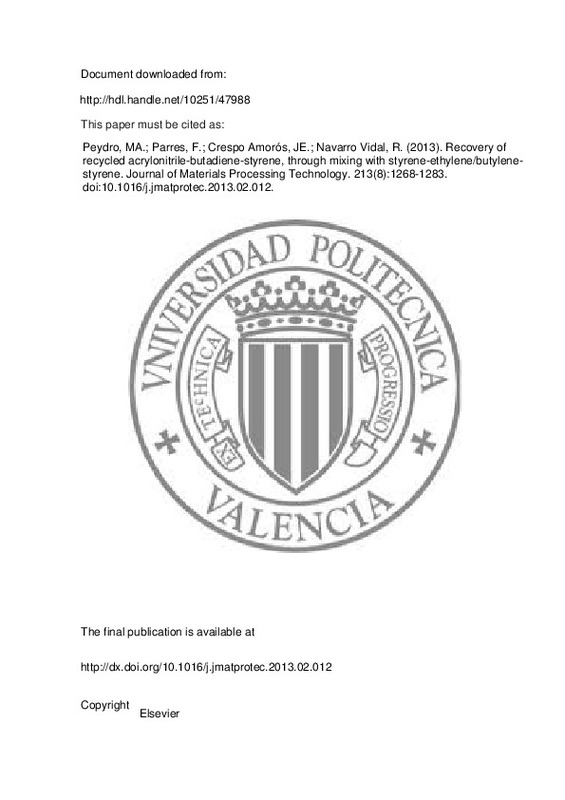JavaScript is disabled for your browser. Some features of this site may not work without it.
Buscar en RiuNet
Listar
Mi cuenta
Estadísticas
Ayuda RiuNet
Admin. UPV
Recovery of recycled acrylonitrile-butadiene-styrene, through mixing with styrene-ethylene/butylene-styrene
Mostrar el registro sencillo del ítem
Ficheros en el ítem
| dc.contributor.author | Peydro, M. A.
|
es_ES |
| dc.contributor.author | Parres, F.
|
es_ES |
| dc.contributor.author | Crespo Amorós, José Enrique
|
es_ES |
| dc.contributor.author | Navarro Vidal, Raúl
|
es_ES |
| dc.date.accessioned | 2015-03-11T11:55:05Z | |
| dc.date.available | 2015-03-11T11:55:05Z | |
| dc.date.issued | 2013-08 | |
| dc.identifier.issn | 0924-0136 | |
| dc.identifier.uri | http://hdl.handle.net/10251/47988 | |
| dc.description.abstract | Recovery of recycled acrylonitrile-butadiene-styrene (ABS) through mixing with styrene-ethylene/butylene-styrene (SEBS) has been studied in this paper. To simulate recycled ABS, virgin ABS was processed through 5 cycles, at extreme processing temperatures, 220 degrees C and 260 degrees C. The virgin ABS, the virgin SEBS, the recycled ABS and the mixtures were mechanically, thermally and rheologically characterized after the various cycles of reprocessing in order to evaluate their corresponding properties and correlate them with the number of cycles undergone. With these data and using Computer Aided Engineering (CAE) the injection process was simulated by obtaining the optimal injection process parameters. Mixtures were injected at two temperatures in a sensorised mold correlating the shrinkage of the parts with temperature. The results show that tensile strength of ABS remains practically constant as the number of reprocessing cycles increases, while in the material injected with SEBS the tensile strength decreases. Concerning the Charpy notched impact strength; the values of the ABS reprocessed at 220 degrees C remain more or less unchanged, while the values for 260 C show a significant decrease. The adhesion of the SEBS causes, in both cases, an increase in impact strength. DSC techniques enabled us to observe how the glass transition temperature (T-g) remains more or less constant regardless of the number of cycles or the temperature, whereas the crosslinking is much greater in the samples reprocessed at 260 C. Finally, the viscosity decreases with each cycle and this decrease becomes even more noticeable with the addition of SEBS, and also that the parts molded at lower temperatures have less shrinkage. (c) 2013 Elsevier B.V. All rights reserved. | es_ES |
| dc.description.sponsorship | We would like to thank the Vice-Directorate of Research, Development and Innovation of the Polytechnic University of Valencia for the help granted to the project: "Ternary systems research applied to polymeric materials for the upgrading of waste styrene", Ref: 20091056 within the program of First Projects of Investigation (PAID 06-09) where this work is framed. | en_EN |
| dc.language | Inglés | es_ES |
| dc.publisher | Elsevier | es_ES |
| dc.relation.ispartof | Journal of Materials Processing Technology | es_ES |
| dc.rights | Reserva de todos los derechos | es_ES |
| dc.subject | Degradation | es_ES |
| dc.subject | Recovery | es_ES |
| dc.subject | ABS | es_ES |
| dc.subject | SEBS | es_ES |
| dc.subject | Injection | es_ES |
| dc.subject | Shrinkage | es_ES |
| dc.subject.classification | CIENCIA DE LOS MATERIALES E INGENIERIA METALURGICA | es_ES |
| dc.subject.classification | INGENIERIA DE LOS PROCESOS DE FABRICACION | es_ES |
| dc.title | Recovery of recycled acrylonitrile-butadiene-styrene, through mixing with styrene-ethylene/butylene-styrene | es_ES |
| dc.type | Artículo | es_ES |
| dc.identifier.doi | 10.1016/j.jmatprotec.2013.02.012 | |
| dc.relation.projectID | info:eu-repo/grantAgreement/UPV//PAID-06-09-20091056/ES/Ternary systems research applied to polymeric materials for the upgrading of waste styrene/ | es_ES |
| dc.rights.accessRights | Abierto | es_ES |
| dc.contributor.affiliation | Universitat Politècnica de València. Departamento de Ingeniería Mecánica y de Materiales - Departament d'Enginyeria Mecànica i de Materials | es_ES |
| dc.description.bibliographicCitation | Peydro, MA.; Parres, F.; Crespo Amorós, JE.; Navarro Vidal, R. (2013). Recovery of recycled acrylonitrile-butadiene-styrene, through mixing with styrene-ethylene/butylene-styrene. Journal of Materials Processing Technology. 213(8):1268-1283. https://doi.org/10.1016/j.jmatprotec.2013.02.012 | es_ES |
| dc.description.accrualMethod | S | es_ES |
| dc.relation.publisherversion | http://dx.doi.org/10.1016/j.jmatprotec.2013.02.012 | es_ES |
| dc.description.upvformatpinicio | 1268 | es_ES |
| dc.description.upvformatpfin | 1283 | es_ES |
| dc.type.version | info:eu-repo/semantics/publishedVersion | es_ES |
| dc.description.volume | 213 | es_ES |
| dc.description.issue | 8 | es_ES |
| dc.relation.senia | 237080 | |
| dc.contributor.funder | Universitat Politècnica de València | es_ES |







![[Cerrado]](/themes/UPV/images/candado.png)

